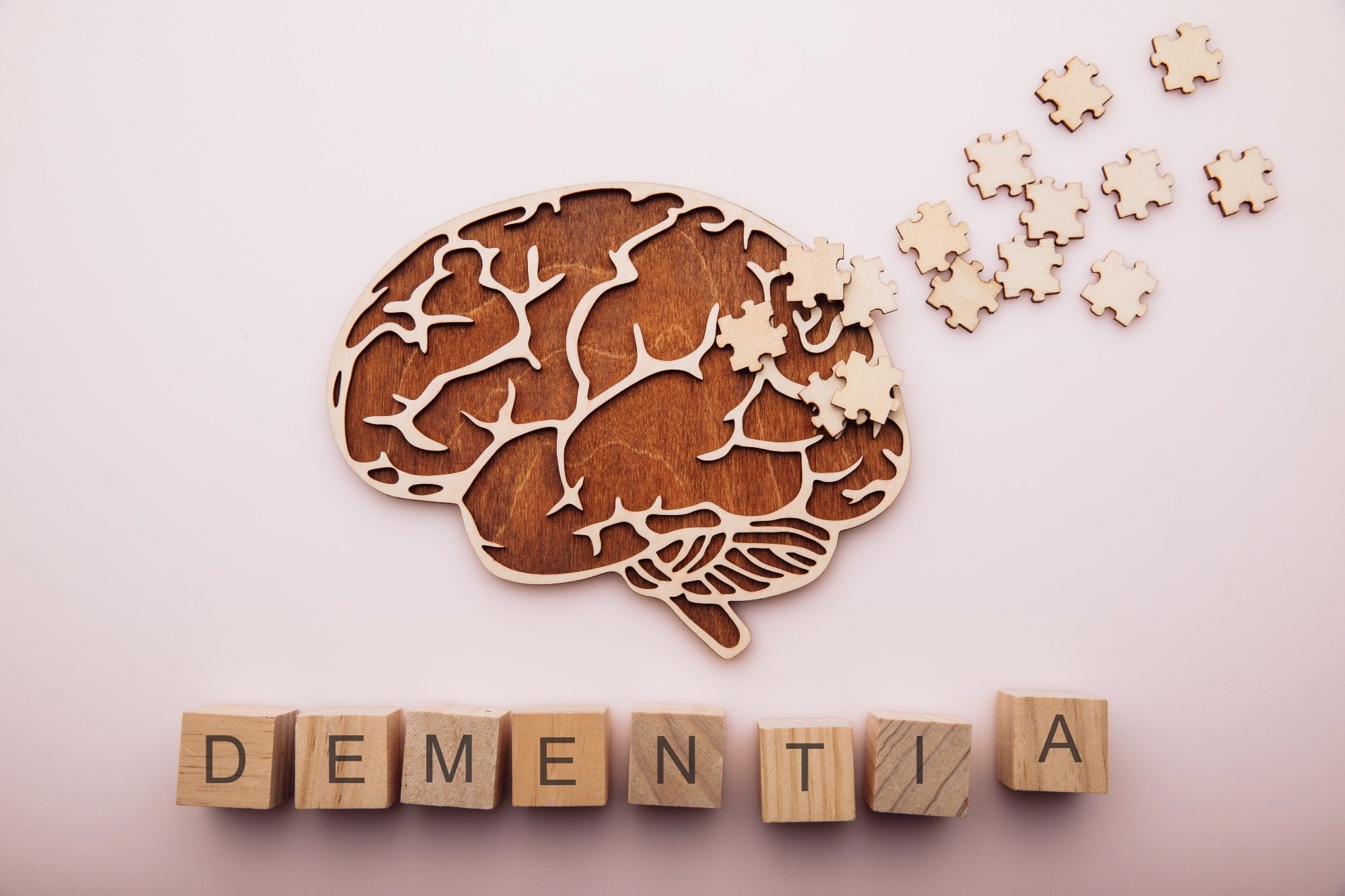New evidence from large-scale genetic and cohort studies reveals that alcohol increases dementia risk across the dose range, overturning the myth of “safe” moderate drinking.

Study: Alcohol use and risk of dementia in diverse populations: evidence from cohort, case–control and Mendelian randomisation approaches. Image Credit: Burdun Iliya / Shutterstock
In a recent study published in the journal BMJ Evidence-Based Medicine, a group of researchers determined whether alcohol consumption, including quantity and alcohol use disorder (AUD), causally increases the risk of all-cause dementia, using large observational cohorts and Mendelian randomization across diverse ancestries.
Background
Every three seconds, another family confronts dementia, a set of conditions that gradually change memory, mood, driving, money management, and independence.
Public advice about alcohol is mixed: some studies suggest light drinking protects the brain, while heavy drinking clearly harms it. However, these signals may reflect who is being studied and when alcohol is measured, rather than actual biological effects. Reverse causation (people drink less as cognition declines) and confounding (education, income, smoking) can bias results.
Genetic approaches can help separate correlation from causation by leveraging inherited variants as natural experiments. Clear answers matter for daily choices, clinical counseling, and policy.
Further research should test whether any “safe” intake exists.
About the study
The investigators analyzed two population cohorts, the Million Veteran Program (MVP) in the United States and the United Kingdom Biobank (UKB) in the UK, to investigate the relationship between alcohol intake and incident all-cause dementia, as defined from electronic health records (EHRs) using International Classification of Diseases (ICD) codes.
Alcohol intake was primarily recorded as drinks per week (DPW); in MVP, the Alcohol Use Disorders Identification Test-Consumption (AUDIT-C) was also available to classify non-/occasional (0-1), low-risk (2-3), and high-risk (>4) drinking. AUD was identified from EHR diagnoses.
Participants were unrelated and stratified by genetic ancestry. Covariates included age, sex, income, education, smoking status, body mass index, and relevant clinical factors.
Observational associations were estimated using Cox models, and the competing risk of death was examined. To address lifetime risk and confounding, the team conducted genome-wide association studies (GWAS)-based Mendelian randomization (MR), using inverse-variance weighted (IVW) estimates.
Exposure instruments captured DPW (quantity-frequency), Problematic Alcohol Use (PAU; a meta-analysis combining AUD and the AUDIT-Problem items), and AUD. They also ran non-linear MR in MVP using fractional polynomials and a doubly ranked approach to test shape (for example, U-shaped versus monotonic) and performed negative control checks against age and sex.
Study results
Across MVP and UKB, 559,559 adults (with a baseline age of ~56-72 years) were included. Over a follow-up (mean ~4 years in MVP; ~12 years in UKB), 14,540 participants had dementia, and 48,034 died. Observational analyses showed a U-shaped association: compared with light drinkers (<7 DPW), higher risks were seen among non-drinkers, heavy drinkers (>40 DPW; hazard ratio [HR] 1.41, 95% confidence interval [CI] 1.15-1.74), and those with AUD (HR 1.51, 95% CI 1.42-1.60). In UKB, moderate intake (7-14 DPW) appeared protective versus light intake, but this pattern was sensitive to when alcohol was measured.
Longitudinal trajectories in MVP clarified why observational curves might appear U-shaped. Using repeated AUDIT-C data, drinkers who later developed dementia reduced their drinking faster as diagnosis approached than drinkers who remained dementia-free; declines were greatest among people who started with higher AUDIT-C scores.
This pattern supports reverse causation: early cognitive decline leading to less alcohol, which can make light/moderate drinking look “protective” when measured late in life.
Genetic analyses changed the picture. Using GWAS instruments for DPW (641 variants), PAU (80 variants), and AUD (66 variants), Mendelian randomization indicated a monotonic, dose-related increase in dementia risk with higher genetically predicted alcohol involvement.
For instance, a one standard-deviation increase in log-DPW was associated with a 15% higher odds of dementia (IVW odds ratio [OR] 1.15, 95% CI: 1.03-1.27). A twofold increase in the MR-scaled prevalence of AUD was associated with 16% higher odds of dementia (IVW OR 1.16, 95% CI: 1.03-1.30).
Sensitivity analyses, which corrected for sample overlap, outliers, and reverse causation, did not overturn these findings; instead, pleiotropy and heterogeneity were assessed. These MR estimates reflect lifetime predisposition to higher alcohol involvement rather than short-term changes in adult drinking.
To test shape directly, the team ran non-linear MR in MVP. Unlike the observational U-shape, non-linear MR showed no protective effect at low intake: dementia risk rose steadily with increasing genetically predicted drinking. For example, an average of ~12 DPW corresponded to a higher risk (OR 1.09, 95% CI: 1.04-1.15). Negative-control analyses found no association of the alcohol instruments with age or sex, supporting validity.
Although power was most significant in European-ancestry analyses, genetic links in African-ancestry samples appeared weaker primarily due to limited power. AUD was consistently associated with higher dementia incidence across African and Latin American ancestry groups in observational data.
Overall, triangulating observational, longitudinal, and genetic evidence points toward alcohol, across patterns and phenotypes, elevating dementia risk, and undermines the claim that low-level drinking is neuroprotective.
Conclusions
This study indicates that alcohol exposure, measured as DPW, PAU, or AUD, raises the risk of all-cause dementia, with no genetic evidence for a protective effect at low levels. Observational U-shapes likely reflect reverse causation and residual confounding, rather than a true benefit.
For people and families, this reframes everyday decisions about “moderate” drinking when planning for brain health.
For clinicians and policymakers, prevention strategies that reduce AUD prevalence may meaningfully lower future dementia burden, with the authors estimating that halving AUD prevalence could reduce dementia cases by up to 16%.
Clear, consistent messaging on alcohol and cognition should emphasize risk across the dose range, especially as populations age.
Journal reference:
- Topiwala, A., Levey, D. F., Zhou, H., Deak, J. D., Adhikari, K., Ebmeier, K. P., Bell, S., Burgess, S., Nichols, T. E., Gaziano, M., Stein, M., & Gelernter, J. (2025). Alcohol use and risk of dementia in diverse populations: evidence from cohort, case–control and Mendelian randomisation approaches. BMJ Evidence-Based Medicine. DOI: 10.1136/bmjebm-2025-113913, https://ebm.bmj.com/content/early/2025/09/16/bmjebm-2025-113913